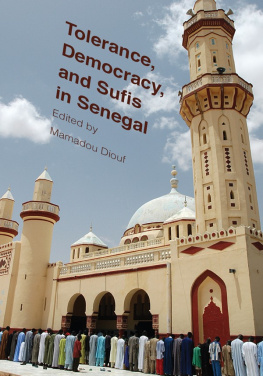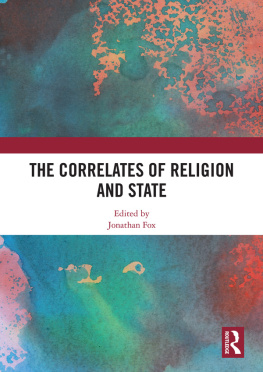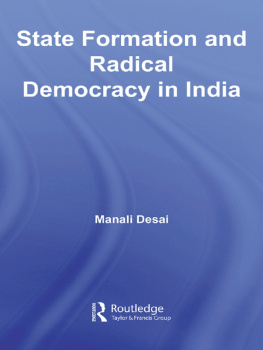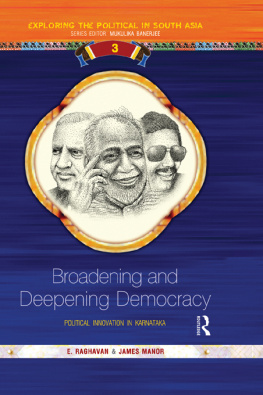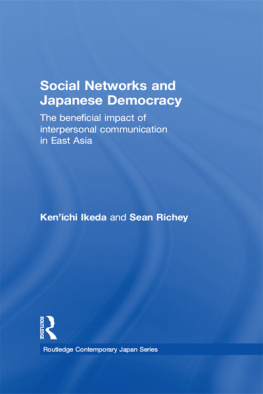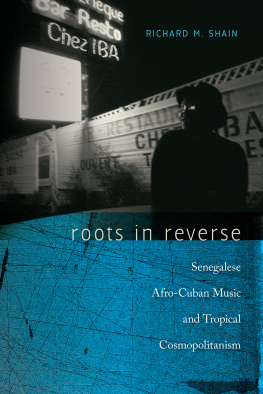Tolerance, Democracy, and Sufis in Senegal
Religion, Culture, and Public Life
Religion, Culture, and Public Life
Series Editors: Alfred Stepan and Mark C. Taylor
The resurgence of religion calls for careful analysis and constructive criticism of new forms of intolerance, as well as new approaches to tolerance, respect, mutual understanding, and accommodation. In order to promote serious scholarship and informed debate, the Institute for Religion, Culture, and Public Life and Columbia University Press are sponsoring a book series devoted to the investigation of the role of religion in society and culture today. This series includes works by scholars in religious studies, political science, history, cultural anthropology, economics, social psychology, and other allied fields whose work sustains multidisciplinary and comparative as well as transnational analyses of historical and contemporary issues. The series focuses on issues related to questions of difference, identity, and practice within local, national, and international contexts. Special attention is paid to the ways in which religious traditions encourage conflict, violence, and intolerance and also support human rights, ecumenical values, and mutual understanding. By mediating alternative methodologies and different religious, social, and cultural traditions, books published in this series will open channels of communication that facilitate critical analysis.
After Pluralism: Reimagining Religious Engagement, edited by Courtney Bender and Pamela E. Klassen
Religion and International Relations Theory, edited by Jack Snyder
Religion in America: A Political History, Denis Lacorne
Democracy, Islam, and Secularism in Turkey, edited by Ahmet T. Kuru and Alfred Stepan
Refiguring the Spiritual: Beuys, Barney, Turrell, Goldsworthy, Mark C. Taylor
Tolerance, Democracy, and Sufis in Senegal
EDITED BY
MAMADOU DIOUF
Columbia University Press New York
Columbia University Press
Publishers Since 1893
New York Chichester, West Sussex
cup.columbia.edu
Copyright 2013 Columbia University Press
All rights reserved
E-ISBN 978-0-231-53089-7
Library of Congress Cataloging-in-Publication Data
Tolerance, democracy, and sufis in Senegal / edited by Mamadou Diouf.
p. cm.(Religion, culture, and public life)
Includes bibliographical references and index.
ISBN 978-0-231-16262-3 (cloth: alk. paper)ISBN 978-0-231-16263-0 (pbk.: alk. paper)ISBN 978-0-231-53089-7 (e-book)
1. IslamSenegal. 2. SufismSenegal. 3. SenegalSocial conditions. 4. SenegalReligion. I. Diouf, Mamadou.
BP64.S4T65 2013
297.409663dc23
2012035168
A Columbia University Press E-book.
CUP would be pleased to hear about your reading experience with this e-book at .
References to Internet Web sites (URLs) were accurate at the time of writing. Neither the author nor Columbia University Press is responsible for URLs that may have expired or changed since the manuscript was prepared.
Contents
This volume has its origin in a 2008 conference held at Columbia University to celebrate the reopening of the Institute of African Studies (IAS) at Columbia. A Sufi recital with the great Senegalese Sufi singer Musa Dieng Kala, and an art exhibition Saint in the City, Senegalese Sufi urban art curated by Allen Roberts and Polly Nooters Roberts at the Arthur Schomburg Center for Research in Black Culture, accompanied the conference. The IAS reopening celebration benefited from the generous support and sponsorship of several institutions: the Institute for Religion, Culture, and Public Life; the Committee on Global Thought; the Institute of African Studies; the School of International and Public Administration; the Center for the Study of Democracy, Toleration, and Religion; and the Henry R. Luce Initiative on International Affairs and Religion. I would like to thank these institutions for their support.
I would like to thank the participants for writing and editing their texts for this book and the audience for their engagement and contribution to the discussion. Although Mansour Sy Djamils contribution to the conference is not included herein, the presentation and the debate it provoked nevertheless shaped this volume.
I would like to gratefully acknowledge the contributions of Musa Dieng Kala, Allen Roberts, Polly Nooters Roberts, and Howard Dodson to the success of the conference. They added to the discussion a much needed aesthetic and cultural dimension. I would like to especially thank Sarah Walsworth, then at the Institute of African Studies, and Emily Brenner at the Institute for Religion, Culture, and Public Life for efficiently handling the complex administrative tasks associated with organizing an international conference, recital, and art exhibit.
It is a pleasure to express my indebtedness to many colleagues for their constructive criticism and very useful feedback on many versions of the introduction to the volume, in particular Jinny K. Prais and Trica D. Keaton. The reviewers for Columbia University Press offered thoughtful and useful commentaries on the introduction and the individual chapters, for which I am also extremely grateful.
At different stages of the production of this volume, three of my graduate and undergraduate students, Katie Hickerson, Mary McDonald, and Alioune Badara Dia, played a crucial role in helping me with the detailsformatting, proofreading, and checking endnotes and bibliographiesof getting the volume ready for publication. I am indebted to them for their assistance.
Finally, I am most grateful for the support and enthusiasm of Anne Routon, my editor at Columbia University, who expedited production of the book and made it an enjoyable experience.
| AEEMS | Association des lves et tudiants Musulmans du Sngal |
| AEMUD | Associations des tudiants Musulmans de lUniversit de Dakar |
| AMEA | Association Musulmane des tudiants Africains |
| CIRCOF | Comit Islamique pour la Rforme du Code de la Famille |
| DEM | Dahira des tudiants Mourides |
| DMM | Dahira al-Mustarchidin al-Mustarchidat |
| FAIS | Fdration des Associations Islamiques du Sngal |
| FAL | Front pour lAlternance |
| HT | Hizb al Tarqiyya |
| JIR | Jamaat Ibadu Rahman |
| MFDC | Mouvement des Forces Dmocratiques de Casamance |
| MMUD | Mouvement Mondial pour lUnicit de Dieu |
| PDS | Parti Dmocratique Sngalais |
| PS | Parti Socialiste |
| PUR | Parti de lUnit et du Rassemblement |
| PVD | Parti de la Vrit pour le Dveloppement |
| UCM | Union Culturelle Musulmane |
The prevailing predictions of the nineteenth century and the beginning of the twentieth century incorrectly announced that religions would suffer a continuous and irreversible decline due to democracy, tolerance, dialogue, and pluralism. Secularism, in particular, will be one of the key drivers of the process of economic and social development. On the contrary, as averred by Ashis Nandy, with a genuine irony:

